[Content warning: discussions of rape and sexual assault]
The midseason finale of Star Trek: Discovery, “Into the Forest I Go,” was a fraught piece of television that touched on the emotional state of several core cast members. But no one’s journey was more painful than that of Lieutenant Ash Tyler.
There are a lot of theories surrounding the identity of Tyler, and the midseason finale seems to confirm those theories subtly without disengaging from his current struggles. When he and Burnham infiltrate the Klingon sarcophagus ship to plant sensors on board, he finally runs into L’Rell for the first time since escaping her capture. The encounter triggers PTSD flashbacks that render him compromised for the majority of the mission, and Admiral Cornwell works hard to talk him back into awareness. During his flashbacks, we see signs of surgery and the Klingon Voq—which plays into the theory that Tyler truly is Voq (he’s played by the same actor), now acting as a Klingon sleeper agent. But it’s clear that Ash is carrying memories of his human life that he believes, and that his capture at the hands of the Klingons was real in terms of his experiencing it. He remembers what happened to him, and has been deeply traumatized by it.
While he explained the terms of his capture as vaguely as possible to Captain Lorca, a later talk with Michael calls on Ash to give more detail of his capture. He reveals that the the only reason he survived over two hundred days as a Klingon prisoner was because he made himself available to L’Rell. Essentially, he permitted unwanted sexual acts and attention because he knew it would keep him alive.
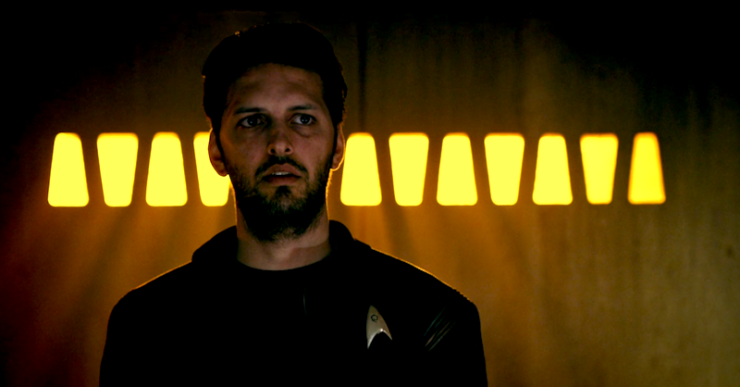
The situation is disturbing for how realistic it is. Ash Tyler had to make a choice, to be continually raped and tortured by his captor, or to die. He chose the former, and horror of that does not leave him just because he managed to get away with his life. Whether or not Tyler turns out to be Voq makes no difference—as Ash Tyler, these events are a part of him, and they have devastated him. His trauma is persistent, detailed, and noted by the people around him.
And while Discovery might be offering the most depth to a conversation around male sexual assault that television has seen in a while, what might be more fascinating is that science fiction has long been a genre where discussing male rape was permissible. Sci-fi has a history of examining the concept of sexual assault from a male point of view, and the reasons for that commonality likely have much to do with depictions of power and how they function with science fiction story tropes.

It should be said that most genres do not take the concept of male rape seriously whatsoever, whether the rapist in question is male or female. Often these situations are the butt of jokes—if a man is the aggressor, it’s often a prison rape joke; if a woman is the aggressor, it’s usually suggested that the scenario can’t be rape because it’s impossible for a man to be uninterested in a woman’s sexual advances. This is constant background noise in the world of sitcoms; and even in other genres where it crops up, such as romance and fantasy, it is rare to see the idea tackled with the gravity it requires. What’s worse, sexual assault toward men in drama often seems to be added for shock value, added in to prove just how bad a situation or specific person is to heighten the stakes of a plot. We have to hope that Discovery will not make this mistake later on in the show’s run, but the signs are promising so far: Tyler’s trauma is not neatly resolved after being brought to the fore, which hopefully means that it is an emotional arc that the show will continue to explore.
Science fiction has done its fair share of winking and nudging too, to be fair—even in Star Trek. William Riker ends up having to sleep with an alien woman to escape her xenophobic planet in the episode “First Contact”… but he doesn’t seem too broken up about it. Jim Kirk is coerced pretty constantly during his tenure as Enterprise captain, yet no one ever frames these scenarios as sexual abuse, despite the fact that he is often only sleeping with the women in question in order to save the lives of his crew. Trip Tucker is impregnated without his knowledge by an alien race Starfleet has never before encountered in “Unexpected.” Odo asks Captain Sisko to prevent Lwaxana Troi from sexually harassing him, only to be told that he should consider her offer. In a situation similar to Discovery, Harry Kim is selected to be the mate of a Klingon woman who assaults him as part of their “mating rituals,” even though Kim wants no part of it. All of these situations are played lightheartedly, or as outright comedy.
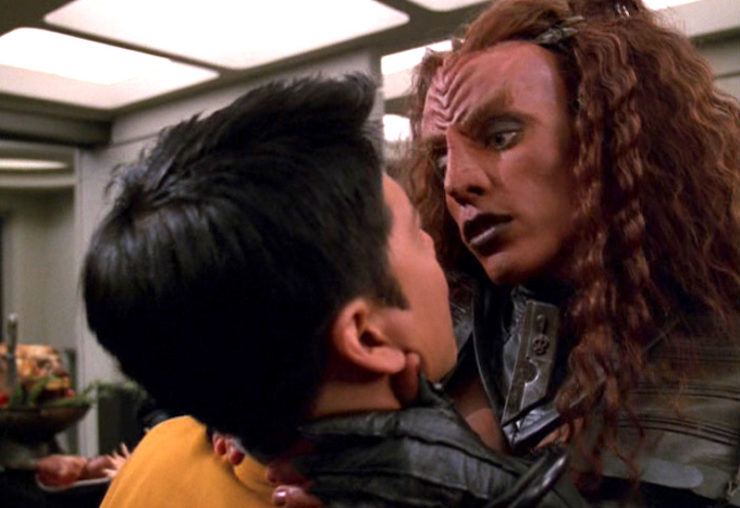
And yet, with Discovery’s turnabout in how these narratives should be treated, it joins the ranks of other science fiction stories (particularly on television) that have made efforts to have this discussion. Those previous stories may not have reached the depth that Star Trek: Discovery has, but they provided a narrative space to consider this abuse rather than making fun of it or shoving it under a very large rug.
In Stargate: SG-1, Daniel Jackson is mind-controlled by the queen Hathor in order to force him to help her create Goa’uld larvae. Because of her power over men, an all-female task force is dispatched to rescue him, and the episode does not brush off the incident as anything less than violent assault—it is clear that there was a struggle in the room, and Daniel can barely speak. When Daniel encounters Hathor again later on in the show’s run, he cannot look at her. In fact, Daniel Jackson’s transformation as the show continues can be read as a desire to eradicate his vulnerabilities in response to abuse by the Goa’uld, of which Hathor’s rape is clearly a key encounter. Daniel Jackson has a great deal of difficulty trusting others, and it is hardly a surprise, given what has happened to him.
Farscape also has its central male character fall into the hands of an alien who rapes him. John Crichton is captured by Peacekeeper Commandant Grayza, who is attempting to extract information from him. She uses a pheromone that is excreted from a gland she had surgically implanted in her body; the effects of said pheromone are much like a roofie. John spends a great deal of time as her prisoner, but seems to bounce back relatively quickly when he is freed, and his feelings on her repeated violation are unclear. However, when he finally confronts Grayza at the end of the show’s fourth season, he makes it clear that her actions left their mark on him:
John: I have been in your hands. There’s no peace there. Just power.
Grayza: You are so self-righteous! I have used all my skills, all my resources for one perfect chance at peace! And because of you, it is gone and I am—
John: Frelled? Screwed? …Raped? Welcome to the Universe, Commandant.

While the show Quantum Leap often made light of toxic sexual situations, Sam Beckett frequently made it known that he was uncomfortable “leaping” into the bodies of other humans from the past, and then expected to interact with the people in their lives as they would. And while the narrative was often making jokes at Sam’s expense to that end, the show did make these deeply uncomfortable moments clear, noting that just because Sam was a man didn’t automatically mean he wanted to sleep with any woman who was willing, particularly when they didn’t know that he wasn’t the person they thought he was. (This dynamic was even more fraught when Sam lept into female people, but that is another conversation for another time.)
The series Misfits dealt with the concept of male consent via Alisha, whose superpower made people hyper-lustful when she touched them. Initially, she uses her power to get men to sleep with her, but when she tries it on Curtis—who knows about her power—he points out that what she’s doing is wrong. Alisha goes back to the men she touched and finds out that they barely even remember their encounters with her. That realization forces her to realize that what did was rape, and she begins to question whether or not it is possible for anyone to consent to sex with her because of the nature of her powers.
Even the most famous superhero in the world is a rape survivor—Batman’s son, Damian Wayne, is the product of Bruce Wayne’s rape at the hands of Talia al Ghul (in certain versions of the story, that is, as comics canon is a wooly thing). In various retellings of this story Talia even uses all the excuses that predators use when Bruce confronts her about drugging him into having sex with her; she tells him that he definitely liked it while it was happening, that it couldn’t have been so bad, that she knew he liked her so that made it okay. And while Bruce loves and accepts his son, he still has no problem making it clear to Talia that what happened between them was not consensual:
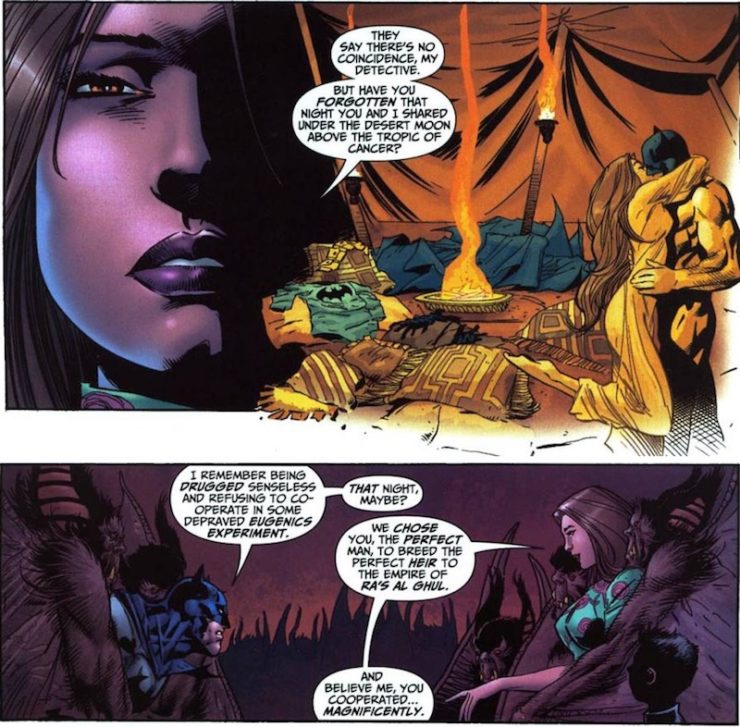
As with Ash Tyler on Discovery, all of these men are capable human beings who hold their own in a multitude of equally horrific situations elsewhere. In Batman’s case, you are dealing with a person who is often considered the peak of physical and mental discipline for a non-superpowered individual. This does not prevent them from being attacked or ensure their personal autonomy—it can happen regardless of personal ability or stature. In fact, it is important that Tyler is portrayed as a thoroughly capable and exceptional officer; Laura Hudson of The Verge makes the point that while some people think that they can brush off the stories of survivors by believing that rape only happens to people who make bad decisions, who aren’t careful, “Tyler’s story was designed around a more revealing, frightening truth: the only thing keeping any of us safe from harassment and abuse is our relative power in a situation. And that can be stripped away from any of us, regardless of gender, by a predator with the inclination and opportunity.”
All the same, there is something that unites most of these narratives that it’s impossible not to touch on: In the majority of the situations, the women in question have special abilities or items, be it extreme physical strength, or super abilities, or strange chemical compounds at their disposal. Perhaps this is the reason why it is easier for science fiction to tackle the concept of male sexual abuse—because if female attackers have interstellar science or untold strength to bring to bear, the idea of a man being sexually assaulted will strike viewers who are inclined to deny these stories as “more believable.” It’s an odd double edged sword to wield contextually because while science fiction uses allegory constantly to create meaningful narratives, you don’t want the audience to come away believing that male rape is only possible when the other party is a Klingon or possesses strange pheromones. It is essential that SF allows us to have these conversations, but not if it leads others to believe that assault is contingent on outrageous alien power.
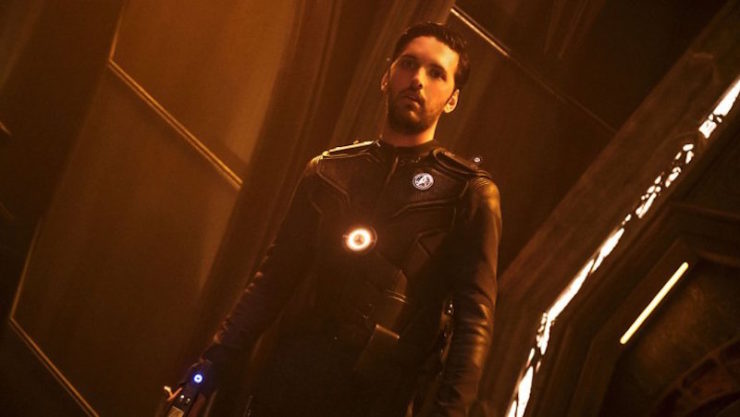
But if the audience understands that fictional power is ultimately a stand-in for everyday power, then the fact that science fiction tackles this subject with such frequency is invaluable. There needs to be a place in the stories we tell to address the darkest corners of human experience, as both a point of education and a chance to reach out to others who have been wronged. The fact that the genre has already displayed an array of male characters who have experienced sexual abuse will let other survivors know that they are not alone. The fact that these characters are also skilled experts and heroes will make it clear that this manner of abuse can happen to anyone. The fact that these characters continue to live their lives shows everyone that those terrible moments do not define them in every moment of their day-to-day existence. Hopefully, Ash Tyler’s journey will contribute even more nuance to this conversation going forward.
If you or anyone you know requires support in the wake of sexual assault, the RAINN Sexual Assault Hotline is available as a resource.
Emmet Asher-Perrin is a Tor.com staff writer. You can bug her on Twitter and Tumblr, and read more of her work here and elsewhere.










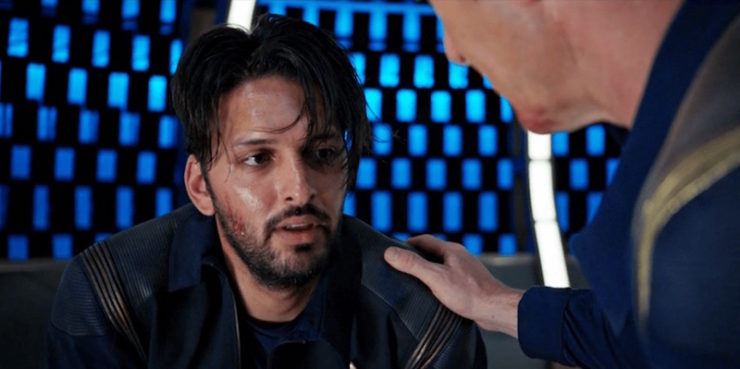
I don’t agree that Riker’s predicament in “First Contact” was played lightheartedly. When I watched the episode with my daughter, who usually groans and rolls her eyes at Riker’s flirting, she spontaneously said: “Oh, the poor guy!”
@1/Jana: To my eye, the “First Contact” scene was definitely intended as humorous. Riker doesn’t see it as sexual assault, he just sees it as a dalliance he doesn’t have time for, and he gives in pretty readily when she insists. If anything, I got the impression that maybe he didn’t find Lanel all that attractive. Traditionally, that’s the only reason a male character in fiction would resist a woman’s sexual advances, and it’s a dynamic that’s often played for laughs (cf. Lena Hyena in Who Framed Roger Rabbit). Ron Jones’s music for the Lanel scene (which I’m listening to as I type this) was definitely humorous in tone.
I thought First Contact didn’t go far enough in making that scene lighthearted. We’re missing the bit where Riker takes advantage of Lanel’s ignorance of his species’ anatomy and mating rituals, placing his hands on her ears, chanting three times, and they’re done. “Was it good for you?” ;)
@2/Christopher: I admit that I don’t have a good ear for music, so anything that’s communicated via music is lost on me. It never occurred to me that the scene was supposed to be humorous. I felt really sorry for Riker. Since the next thing that happened was that he was seriously injured during his escape attempt, the whole situation seemed quite dire.
@4/Jana: That was the idea, I think — for the seduction scene to be a bit of comic relief before the more intense, heightened danger that followed. The sudden change of tone from a light moment to a violent moment can make the latter more shocking to the audience.
Here’s what I said about the scene in my comments for Keith DeCandido’s rewatch of the episode back in 2012 (wow, it’s been that long?):
It looks like several other commenters there saw it the same way.
I can see this as a step forward, however there are multiple aspects of how this plot development was performed and filmed that make me really uncomfortable:
1. A lot of people are already framing their interpretation around the foreshadowing that Tyler may be Voq, and therefore the event wasn’t really rape at all.
2. Unlike Lorca and Saru, Tyler’s PTSD needs to be sold with extensive flashback sequences, rather than the weight of his own words.
3. Cutting those scenes with horror-erotica elements undermined that narrative for me. Interrogation about whether any element of the assault was erotic is a common way that survivors face gaslighting.
It feels bad to put perfect in front of good here, and after all, these are routine cinematic elements of how rape is shown in SFF. But, rather than offering nuance, I think they undermine the story told here. (Given how people routinely stretch to rationalize sexual assault, I’m not certain nuance is the best option for this topic.) And I feel very uncomfortable watching Discovery forward as a result.
I continue to marvel at the popularity of the “Tyler is really Voq” theory because it seems to me that the exact opposite is far, far more likely, especially as small details continue to dribble out. (And all the complicated speculations about how one character may have been planted in the other’s mind seem to me unnecessarily complex.)
I think Tyler is really Tyler. I also think that he was recruited by Starfleet Intelligence to go deep, deep undercover as a sleeper agent/observer in the Klingon Empire (much as Diane Duane had her human protagonist embedded in the Romulan (or “Rihannsu”) Empire in the novel The Romulan Way). If this is the case, then what he endured with/from L’Rell will most likely have been part of the process of establishing (or maintaining) his cover as Voq — which puts a slightly different spin on the consent issues yet in no way invalidates the seriousness of the PTSD experiences Tyler is going through as he works with Burnham. Even if Tyler knew going in that torture, including the prospect of sexual torture, was a probable component of becoming Voq and maintaining that cover identity, it will have been necessary to his purpose for “Voq” to experience and react to those events as torture. And that’s, if anything, a recipe for even greater stress and emotional frazzlement than getting tortured and raped in one’s own persona.
It also strikes me as infinitely more plausible than the idea that Voq is a Klingon masquerading as the human Tyler. A lot of people have pointed out a great many problems with that theory, essentially boiling down to it being impossible for any Klingon to pull off such a deception on a long-term basis. I think those people are right, and that it’s a lot easier to handwave the idea of a cross-species infiltration in the other direction.
This does, mind, raise a number of intriguing questions about L’Rell. Certain aspects of the ongoing plot suggest that she knows who “Voq” really is/was, and it’s not yet clear where her true loyalties lie. I tend to think that she does know, and that what started as prisoner abuse may well have spawned a more complex romantic relationship between L’Rell and Tyler (and I do mean L’Rell and Tyler, not L’Rell and “Voq”. From a storytelling perspective, that seems to me the angle that allows for the most interesting possibilities going forward — because it sets up a triangle in which nobody can be cast wholly as a villain, and one in which L’Rell has to come to terms with what she did to someone whom she has subsequently come to love.
Time will tell. For the moment, though, I think the odds are very much in my favor.
Agree 100% with you ChristopherLBennett
If Tyler is looking for emotional support he may have picked the wrong girlfriend. Is that stifled panic I see on Michael’s face?
@5/Christopher: I have no doubt that you are right and I was wrong. Which means that the scene worked for me despite the writers’ intentions.
“Is that stifled panic I see on Michael’s face?”
I think it’s the look of someone who’s just had a loved one tell them about a past trauma and she’s wondering “how am I supposed to deal with this and make it better?”
So yes, maybe mild panic. After all, she knows that emotional support isn’t her strong point and she knows that she’s going to have to learn very quickly.
@13, yes, to be fair a human reared girlfriend fully in touch with her emotions would be intimidated by the prospect of trying to deal with such trauma. Will Culber be any help?
Nice piece. Do we have confirmation that Voq was indeed played by Shazad Latif, beyond the fact that Javid Iqbal seems to be inexistent?
Yes, but unlike the pheromones (which might be a stand-in for roofies), a physically stronger Klingon is much more obvious as a stand-in for anyone physically more powerful than their victims.
And another show that played pheromone roofies (in males and females) for laughs was The Orville last week. I quote myself from another thread:
@1/10 – Jana: Yes, for the time, the Riker thing was played perpahs not as comedy, but at least as “oh, Riker, that interstellar ladies man!”. We, today, understand it as sexual abuse, because we’re more aware about these things than we were back then.
@6 – KJS: I understand some of your reservations about the “horror erotica” aspects, but first you say:
… and then:
That’s exactly it. Some people need a hammer over the head to grasp sexual assault.
@9 – princessroxana: We don’t really choose those things, do we?
@14 – princessroxana: Perhaps Culber is also a counselor.
As portrayals of abuse go, I am not enthusiastic about Ash Tyler.
A lot of this is ST:DISCO’s general tendency to forget about things that aren’t directly in front of their faces — how is somebody with this level of scarring and trauma just plopped into a key role on a critical starship? How can he possibly be functional — let alone charming, competent, and well-adjusted in literally every scene he’s had except meeting L’Rell?
But what really nails the coffin shut is when he tells Burnham that being with her “makes it all worth it.” That is so messed up, I don’t even have words for it :-/
I really like the observation about SF making it “easier” to abuse men, and how that both makes it easier to address the topic, but also maybe makes it feel like something “that couldn’t happen in real life.” Lovely insight; thank you!
MaGnUs; Perhaps Culber is also a counselor.
God I hope so. This ship so needs a mental health professional. Maybe two or three, or ten or twenty!
Jim Kirk is coerced pretty constantly — Eh? What am I not remembering?
@19/Tamfang: Well, to start with, there’s “Dagger of the Mind,” where Helen Noel literally brainwashed Kirk into believing he’d had sex with her, a gross violation of professional ethics. Followed by Dr. Adams piggybacking on her mind-rape and brainwashing him into thinking he was in love with her. Nona in “A Private Little War” used her “Kanutu witch woman” spells to make Kirk her love slave, and Elaan in “Elaan of Troyius” did much the same with her tears. In “Plato’s Stepchildren,” Kirk and Spock were forced to make out with Uhura and Chapel for the Platonians’ amusement. In “Wink of an Eye,” Deela seduced him while he was her prisoner under threat of death; it was played as consensual and something he did to manipulate his enemy, but it was still an intrinsically coercive situation, especially since she believed the acceleration had made him docile and obedient, i.e. unable to refuse.
Then there’s Flint in “Requiem for Methuselah” manipulating Kirk to fall in love with Rayna. Given how hard Kirk fell in less than four hours, many viewers have suspected that something was making Kirk fall in love, maybe a pheromone or something. And certainly Janice Lester literally taking over Kirk’s body in “Turnabout Intruder” constitutes a coercive situation.
So I wouldn’t say it was “pretty constantly,” certainly not in the first two seasons, but it was a recurring theme, and not limited to Kirk. Heck, the very first Star Trek story ever, “The Cage,” was about aliens abducting humans and trying to trick or compel them into mating.
Thanks for trying to spin the discussion on this awful episode into something more meaningful, and this was a really good overview of the topic as it’s been covered in the past by Star Trek, Stargate, and probably best of all handled in Farscape, but … (a) Ash Tyler is almost certainly Voq and his memories are probably traumatic not because he was raped but because that’s how his mind interpreted the surgical/mental changes, (b) even if he’s not, Ash Tyler is even less likable a Star Trek character than early Wesley Crusher or Tom Paris, so my internal outrageoumeter isn’t proabably what it should be.
This article served to remind me to cancel my CBS Online subscription. I’ve given this show eight chances to give me a reason to do anything but weep for the funeral of Star Trek and it has failed miserably.
The funeral of Star Trek, right…
@20/Christopher: When Tyler said about L’Rell that she “took a particular interest in me. And I saw a way out. […] I encouraged it”, I was reminded of “Catspaw”.
Women in a similar position have accepted, even pretended enthusiasm for advances from captors. I don’t imagine that left them feeling any less violated and used.
I wonder how Kirk felt about having sex with Deela. Like a victim,like a cad, like both?
21. Bill: “(b) even if he’s not, Ash Tyler is even less likable a Star Trek character than early Wesley Crusher or Tom Paris”
Likability is subjective, but Ash certainly has more personality than either of those two.
20. CLB: “Kirk and Spock were forced to make out… “
Wasn’t this the original slash fanfic?
@25/Sunspear: “Likability is subjective, but Ash certainly has more personality than either of those two.” – He does? That may be subjective too. I find that he’s quite a stock character.
26. JanaJansen: True. Our responses are all subjective, some more intense than others. But yeah, Ash is less a non-entity than Wesley or Paris. Once the mystery is solved, it may be even more so. The “stock” may be a role he’s playing.
@27/Sunspear: You’re right, it may be a role. Still, if our protagonist falls in love with this guy, the writers could have tried a little harder to make him both likable and interesting. Not only is he a stereotypical damaged soldier, even his “big plans” for the time after the war are boringly generic. Fishing trout in a lake? That feels like straight out of a beer commercial.
I know I’m odd, but I kinda like Wesley Crusher. Better than his mother anyway, at least in the scenes they had together. In some of the later episodes, she was portrayed at having quite a scientific mind herself, but this trait of hers never showed when she talked to her son. I would have loved to see them chat about science, the way I do with my daughter. Wasted opportunities!
28. JanaJansen: “Fishing trout in a lake? That feels like straight out of a beer commercial.”
The show may do a twist or throw a wrench in the Voq/Ash theorizing, but I saw nothing real in what he was saying to Burnham during that scene. It likely felt generic because they were fake, implanted memories/images. The spycraft involved here may be so deep that he’s not even aware of the other, buried personality. It may be what L’Rell meant when she told Voq he would lose everything when he went to her (matriarchal) clan, who apparently specialize in the clandestine arts.
A new example of the thread subject cropped up in last night’s Dirk Gently’s Holistic Detective Agency episode on BBC America. Dirk, who is in both a deep funk and an alternate universe, is set upon by a freakishly strong female being of some sort who knocks him out, puts a leash on him, drags him around, and declares that he’s her “boyfriend” now, giving him no say in the matter. Since he’s given up on himself, he accepts it philosophically as the fate he deserves, and the whole thing is played for humor. So, yet another example of sexual harassment/assault upon men being treated as a joke, and of SF/fantasy situations making it easier to make a female character the aggressor. I could’ve done without this plot point, even though it ultimately fizzled out and was mainly just a device to give Dirk someone to monologue to while the other regulars were elsewhere. It would’ve been better, say, if she’d simply treated Dirk as a pet rather than a “boyfriend.”
@30/Christopher: Incidentally, Deela called Kirk her “pet” in the “Wink of an Eye” script, although that didn’t make it into the episode.